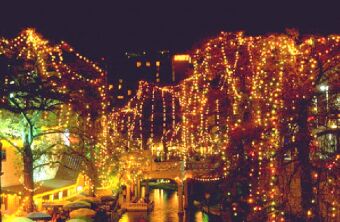|
|
|
|
"And it came to pass in those days, that there went out a decree from Caesar Augustus, that all the world should be taxed. And all went to be taxed, every one into his own city. And Joseph also went up from Galilee, out of the city of Nazareth, into Judea, unto the city of David, which is called Bethlehem (because he was of the house and lineage of David), to be taxed with Mary his espoused wife, being great with child." This familiar Bible story is related every year at during the Christmas season in churches and homes the world over. In Mexico each December, it actually comes to life once again, as Joseph and Mary's long-ago search for shelter is reenacted for nine consecutive nights in the festive ritual of Las Posadas. "Posada" means inn, or lodging, in Spanish. The idea of commemorating the holy family's journey to Bethlehem can be traced back to St. Ignatius Loyola, in the 16th century. He suggested a Christmas novena, or special prayers to be said on nine successive days. In 1580, St. John of the Cross made a religious pageant out of the proceedings, and seven years later the nine-day remembrance was introduced to the Indians in Mexico by Spanish missionaries. Solemn and deeply religious in feeling at first, the observances soon became imbued with a spirit of fun and, eventually, left the church and began to be celebrated in people's homes where the entire community joined in.
The pilgrims line up behind the angel and the children bearing the figures of the Holy Family, and they file through the house until they arrive at a closed door, behind which the innkeepers have stationed themselves. The pilgrims knock on the door and call out in song, asking for shelter. A chorus of voices on the other side asks: "Who knocks at my door so late in the night?" The pilgrims respond, "In the name of Heaven I beg you for lodging - my beloved wife can no longer travel, and she is weary." But the response is an unfriendly refusal. "This is no inn. Go Away!" After repeated requests for shelter, the pilgrims explain who they are, and that Mary will soon give birth to a baby. The innkeepers relent and welcome the exhausted travelers: "Enter, holy pilgrims. Come into our humble dwelling and into our hearts. The night is one of joy, for here beneath our roof we shelter the Mother of God." Everyone enters the room and kneels in prayer, after which the party moves out to the patio for fireworks and fun. Baskets of holiday sweets, called colaciones, have been prepared along with other food and drink. In large cities, so many posadas are held that active partygoers can manage to attend four or five in one evening. For eight nights similar ceremonies are repeated. But on the ninth evening, Christmas Eve, a particularly impressive posada takes place, during which an image of the Christ Child is carried in by two people who have been selected as the godparents. With great reverence, the image is laid in a tiny crib in the nacimiento. Sometimes a Christmas Eve posada will have live people representing the Holy Family, with Mary riding a donkey, and the procession concluding at a manger scene set up in a field. The people in the procession carry faroles, transparent paper lanterns containing lighted candles, attached to long poles. Although a truly Mexican Christmas observance, the posadas have, wandered north into the United States, also. San Diego, California, presents posadas at the Mission of San Luis Rey, in the Old Town section, and in the Padua Hills where performances have been given for many years. La Sociedad Folklórica continues the tradition in Santa Fe, and Mexican-Americans in San Antonio, Texas (below) have their processions along the city's famed Riverwalk.  |
